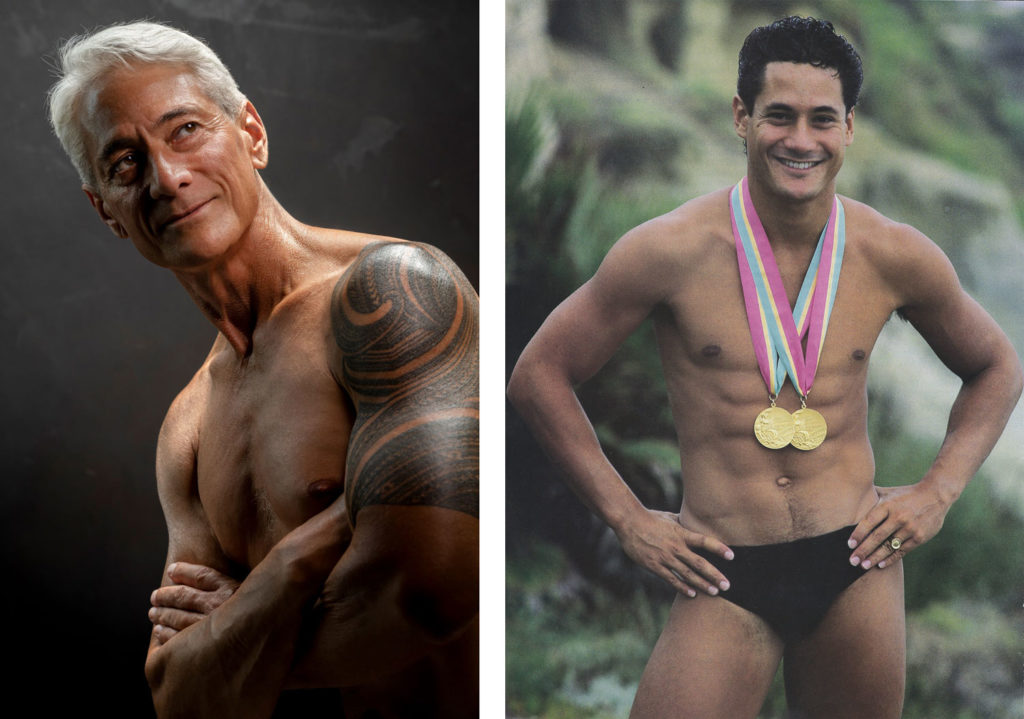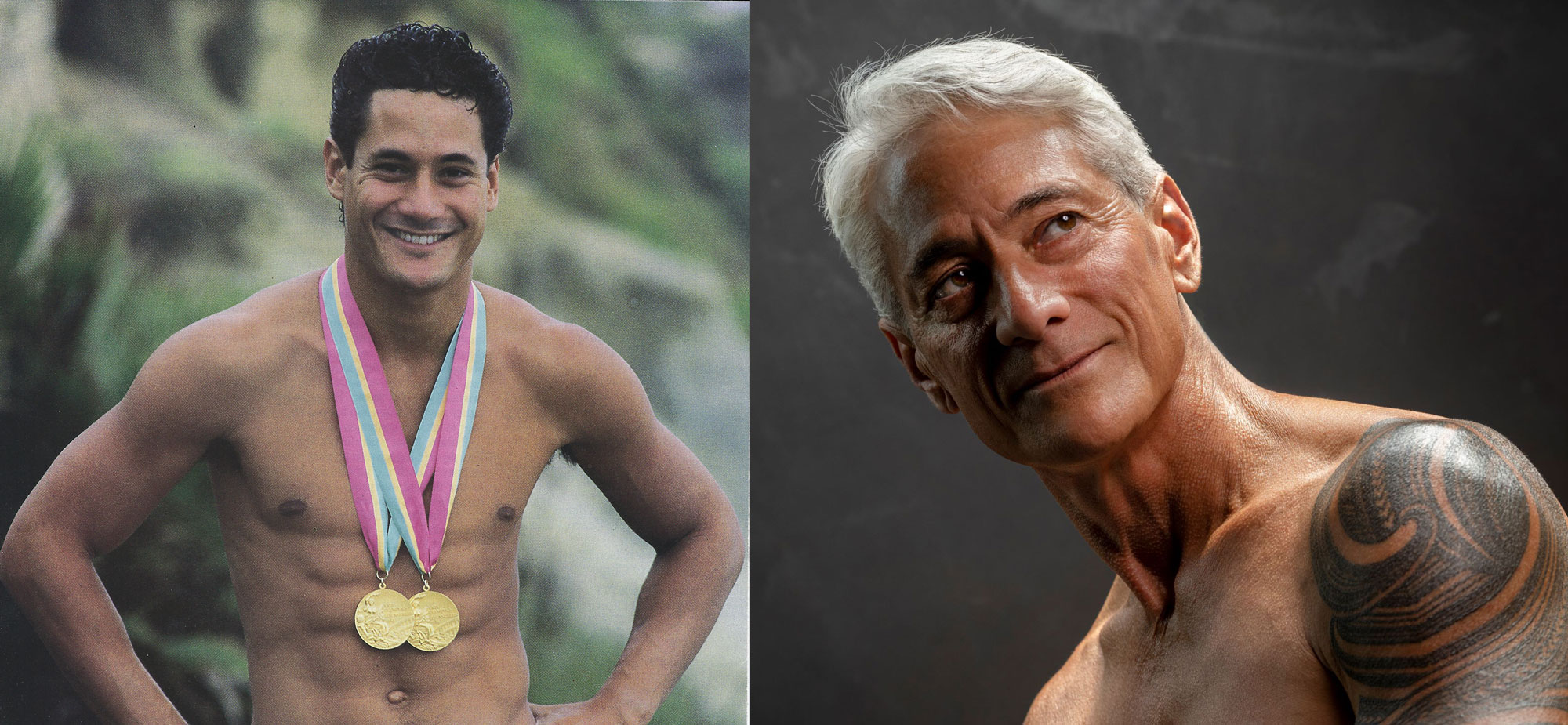The Olympian and activist talks about his life and his commitment to the LGBTQ+ community.
By Brian Scott Lipton
By the summer of 1988, Greg Louganis was in the history books, having become the first male diver to win gold medals (four in total) at consecutive Olympics. Moreover, he had done so in 1988 after striking his head on the springboard, suffering a concussion in the process—an accident that was watched around the world with horror and trepidation.
Louganis made history again in 1995 by becoming was the first Olympic athlete to come out as gay and HIV-positive in his autobiography Breaking the Surface, and in doing so, became an inspiration to millions of people all over the world.
The past 27 years have not always been easy, or even lucrative, for the now 62-year-old Californian. But Louganis has never given up on trying to help others by speaking on a variety of important topics and sharing his story in the hopes that he can help others on their own journey to peace and contentment.
For this Pride issue, Louganis took the time to speak to Connecticut Voice about his past, present and future; his advice for those struggling to come out or move forward; and the issues still facing his beloved LGBTQ+ and sports communities.

V: Congratulations on using your celebrity for good! Was doing any of this something you could imagine nearly 35 years ago?
GL: It’s such a different space I am in now as opposed to then. I didn’t think I’d get here. I was diagnosed with HIV at 28 and I was just grateful to make it to 30. I thought I had two years to live, which was the common diagnosis at the time. When 30 came and went, I felt like I was living without a phone or any form of communication, because that’s what secrets do; they isolate you. And then I became confident I wasn’t the only one feeling like this. That was the push for me to do the book, Breaking the Surface. I realized I needed to let go of the secrets. And I am so glad I did because it was so freeing to not worry about who I said what to whom. I was able to share whatever was going on at the time with whoever I chose and talk about my challenges living with HIV. Being able to share that and not be afraid such was a gift. And better yet, letting go of my secrets allowed other people to be supportive.
V: Even in 2022, there are still people out there who are afraid to come out, especially in their workplace. What advice would you give someone in this position?
GL: It’s important to examine what the workplace means to you; if it’s a place to just clock in your hours, maybe it’s not so important. But if you love your job, and that workplace is part of your community, then I would advise someone that it is good to be open and authentic and let the people around you know who you are.
V: You recently wrote “It is never how far you fall or how many times you do so; it is all about getting back up and getting back in the game.” You’ve managed to do that so many times and in many arenas from entertainment to activism. What do you say to people who just want to give up?
GL: As it happens, I just went through a real emotional upheaval recently. The event that broke the ice of me dealing with everything going on in my life was my dog got hit by car. I’ve been reading this book Radical Brilliance by Arunja Ardagh, and one of the things he said is that in the evenings you might want to schedule yourself a breakdown. It gave me permission to do just that because often after a breakdown you have a breakthrough. I had to untie this whole bundle of tangled yarn, and I had no idea of how to proceed. In sobriety, they say to just do what’s in front of you; but if your yarn is so tangled, you simply don’t know how to start to untangle it. I realized what you need to do is decide what’s most important to you, which gives you the focus and the energy you need to move forward.
V: Do you think we’re all succumbing to the pressure of living via social media?
GL: Yes. I think there’s a lot of pressure we feel from social media. We’re seeing these other people’s lives and it looks like they’ve got everything all together. We need to remind ourselves it’s just a snapshot; it’s not real life. Nonetheless, we go on and start to compare our lives to theirs and judge ourselves and become hypercritical. We wonder if they can do everything, why can’t I? But I bet if we could talk to them, they would tell us that their lives are not that great. We need to get away from that kind of self-judgment. One thing I’ve learned is my mind is going to lie to me and tell me stories, but my body always tells me the truth. If I take a deep breath, it really helps me learn what’s the next positive step I need to take.
V: Here’s another recent quote of yours that really resonates: “Don’t look outside of yourself for the validation you are seeking, turn inside and find that love within.” How long did it take you to believe that?
GL: These things come in waves. Some days you do really good, some not so much. It could just be you didn’t sleep enough or eat enough. What helped me move forward is this book, Loving What Is by Byron Katie. He talks about how you feel when you think a particular thought or what if you didn’t think that thought? And not only do you then realize your mind is telling stories that are untrue, as I said, but you also realize you may be trying to read the mind of someone else or reading in something to a gesture or even a non-response to text. You don’t know what someone else is thinking—or going through.
V: What gladdens—and saddens you—most about how this country treats the LGBTQ+ community in 2022?
GL: In many ways, we’ve come a long way, but what recently happened in Florida (the passage of the “Don’t Say Gay” bill) is also exposing how much bad behavior and bad thinking still exists. Studies prove that most aggression and hatred comes out of fear. It’s more a commentary about what’s inside other people and not about the LBTQ+ community. People just need to open hearts and educate themselves and there would be far less fear.
V: Let’s talk about the sports world. Has there been enough progress?
GL: Again, I think that the sports community still has far to go; it’s been kind of unfair to the transgender athletes. My question is how can we be inclusive and embrace each other, even if there are issues like breaking records involved [when transgender athletes compete against cisgender athletes]. Too often, people forget there are real people at the end of these discussions and conversations, and we discuss this subject like real people aren’t involved.
V: Clearly, you are a major influence on so many people right now. Who were some of your influences when you were growing up?
GL: I can tell you I didn’t have heroes in sports. I remember watching people like Wayne Gretzky and Michael Jordan, and while I admired them, I am not sure I agreed so much with them about their views in other areas of life. I always hoped I could be better—and do better—than the people I grew up with. I owe a lot to my LGBTQ posse, including my editor Mitchell Ivers and co-author Eric Marcus on Breaking the Surface. They both knew I needed an education, so they set up meetings with people like Armistead Maupin and Paul Monette and Larry Kramer. And later on, in 1999, I was on stage with Alexandra Billings in Larry’s play, Just Say No, —he actually called me and asked me to do the play out in Chicago—and she was the first transgender person I ever really knew. Talking to her at lunch about HIV and our medications was such an education. She was so supportive, and it was so wonderful to talk about these things without the fear of being judged. That experience really changed my life.
V: What does your future hold for you?
GL: I have my own podcast in development called Breaking the Surface, which is really exciting! I hope to be able to cover so many different topics, from being bullied as a kid, to what’s happening in Russia and Ukraine to the role of steroids in professional sports. And I think I am getting to a place in my life where I am okay respecting other’s views and opinions more than I used to. I’ve also been writing a musical for years, and we’re finally putting it together. And there’s probably another book somewhere in my computer, but I am just not good at organizing.
It’s clear with all that he’s got going on, Louganis is committed to doing good in the world and for the LGBTQ+ communities. He’s used his celebrity to be heard, and it’s a safe bet that he’ll continue making waves.








More Stories
Connecticut Sun: Playing for Good
Call Him Mister Connecticut: Jean Carlo Salazar’s Journey as Nurse, Model and Pageant Contestant
Ensuring a Seat at the Table